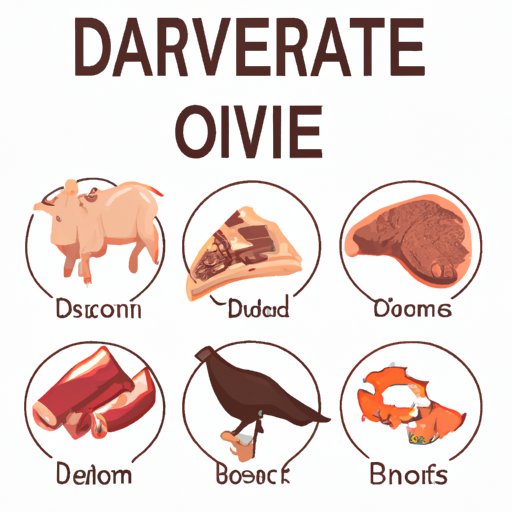
Introduction
The carnivore diet, also known as the all-meat diet, is a dietary approach that involves consuming exclusively animal products such as meat, eggs, and dairy. While it has gained popularity among some health enthusiasts, it has also sparked controversy and raised concerns about its healthfulness in the long run. In this article, we will explore the pros and cons of the carnivore diet, dissect the scientific evidence behind it, examine expert opinions, share personal experiences, and debunk common myths.
Breaking Down the Pros and Cons of the Carnivore Diet: Is It Really Healthy?
Proponents of the carnivore diet claim that it can lead to rapid weight loss, improved digestion, reduced inflammation, and enhanced mental clarity. However, some possible drawbacks include nutrient deficiencies, increased risk of heart disease, and difficulty adhering to the diet long-term.
On one hand, the carnivore diet can be low in carbohydrates, which can trigger the body to burn stored fat for energy and reduce insulin levels. This effect can result in quick weight loss for some people, although it is not sustainable or healthy long-term. Additionally, some people report that their digestive issues improve on the carnivore diet due to the elimination of certain inflammatory foods like grains and legumes.
On the other hand, the carnivore diet lacks essential nutrients such as fiber, vitamin C, and certain minerals. Prolonged deficiency in these nutrients can negatively impact health and potentially lead to serious conditions such as scurvy. Furthermore, consuming high amounts of saturated fat and cholesterol, which are prevalent in animal products, increases the risk of heart disease and other chronic illnesses.
Ultimately, whether the carnivore diet is healthy or not depends on various factors such as individual genetics, health status, and dietary preferences.
The Science Behind the Carnivore Diet: What the Research Says About Its Healthfulness
While there is limited scientific research on the carnivore diet, some studies have suggested potential benefits and risks. For example, a small study published in the International Journal of Environmental Research and Public Health found that a short-term carnivore diet intervention led to a significant reduction in body weight and blood pressure among participants. However, it lacked long-term data on its effectiveness or safety.
Others warn that the health risks of a carnivore diet are severe and varied. It has been associated with nutrient deficiencies, particularly fiber, vitamin C, folate, magnesium, copper, and manganese. Several long-term studies have shown that high saturated fat and cholesterol intake from animal-based foods lead to an increased risk of heart disease, diabetes, and certain cancers. Furthermore, as the diet omits many fruits and vegetables, it is unclear how to replace the micronutrient supply without supplementation, making the diet not sustainable for many people over a long period of time.
What Nutrition Experts and Doctors Are Saying About the Carnivore Diet’s Health Impacts
Nutrition experts and medical professionals generally weigh in that the carnivore diet is a highly restrictive and potentially unbalanced way of eating. It can lead to nutrient deficiencies and an increased risk of chronic diseases. They also noted that the diet lacks sufficient evidence for safety and effectiveness.
According to Matthew Fort, a registered dietitian, “From a scientific perspective, there is no plausible or rational justification for the carnivore diet.” He notes that the potential benefits of weight loss and mood improvements can be accomplished without animal protein by adopting a balanced and varied diet. Additionally, several health organizations, including the World Health Organization and the American Heart Association, have warned against consuming too much saturated fat and cholesterol, which are central to the carnivore diet.
My Experience Trying the Carnivore Diet: A Personal Account of the Pros and Cons
As with any diet, personal experiences with the carnivore diet can vary widely. It is important to note that anecdotal evidence is not a substitute for scientific research and nutritional expertise, but it can provide insight into what individuals may experience.
In some instances, people reported significant weight loss, increased energy levels, and reduced symptoms from autoimmune disorders. Others reported digestive issues, feeling lethargic, and a lack of variety with the elimination of non-meat products. Furthermore, some people have developed health issues such as kidney stones and severe nutrient deficiencies after following the carnivore diet for an extended period.
The Carnivore Diet: Debunking Common Myths and Misconceptions
There are several common myths and misconceptions surrounding the carnivore diet that must be addressed. One myth is that it is a natural human diet since our ancestors consumed a large amount of meat. However, this claim is invalid as humans have evolved to eat a diverse range of foods that are available without relying on solely on meat.
Another common misconception is that the carnivore diet is necessary for optimal health. However, no scientific study supports the assertion that it is superior to other dietary patterns such as a plant-based or Mediterranean diet. In fact, the available evidence suggests that a balanced diet that is rich in fruits, vegetables, whole grains, and plant-based proteins is the best approach to achieve optimal health.
Conclusion
The carnivore diet is a highly controversial dietary approach that has gained traction in certain health and fitness circles. While some proponents claim it to be a “cure-all” for various ailments, it falls short of a balanced diet and can put individuals at risk of nutrient deficiencies and other long-term health problems. It is crucial to weigh the pros and cons of any dietary regime and seek nutritional expertise before making significant changes to your eating habits. The key takeaway is to prioritize health and well-being and stick to a balanced and sustainable dietary approach.





